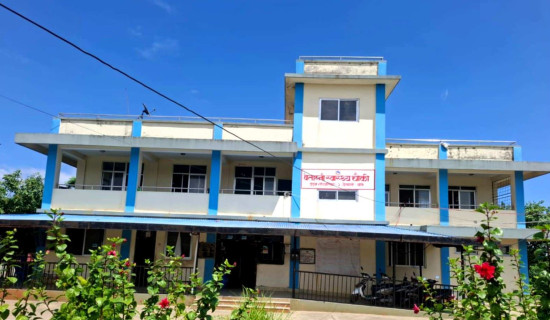- Wednesday, 2 July 2025
Widen Tax Net
Tax is the money residents of a country pay its government for the public services it provides to them. Taxes are based on income they make, and they form the main source of revenue for the government. In recent years, Nepal government has been struggling to collect enough taxes as revenues to fund its expenditure. In an effort to turn the table on this dire situation, a High-Level Tax System Reform Suggestion Committee has submitted its final report to the government. The report states that implementation of the suggestions included in the report will help increase revenue mobilisation, create new jobs and improve public finances, says the Ministry of Finance. Among many suggestions made in the report, two stand out: cutting tax rate and widening the scope for more revenue.
It should be kept in mind that tax cut is a double-edged sword with both positive and negative implications for the economy. That it can pay dividends if rolled out prudently is shown by this example: In the wake of the then US government's corporate tax cut in 2018, ushered in under its tax reform programme, many corporations – big and small – felt incentivised to bring home hundreds of billions of dollars parked in tax havens abroad to evade exorbitant tax at home and inject it into the economy. Buoyed by the sudden flood of capital, the economy then experienced substantial growth. On the downsides, such tax cut can starve the government of much-needed money to fund its expenditures. So, striking a balance is the key.
Taxpayers will be happy to pay their taxes if they get something worthwhile in return. If their taxes are used for the upkeep of the public infrastructure, for keeping environmental pollutions at bay, for creating environment conducive to raise their earning as well as standard of living, among other benefits, they will have no problem contributing to the government's coffers. But in the case of Nepal, tax evasions amounting to billions of rupees, including by using fake invoices, has become a matter of serious concern, depriving the government of a crucial resource to spend on development works.
To tackle this issue, Prime Minister Pushpa Kamal Dahal Prachanda has pledged to take stern actions against such tax evaders. We suggest it take stern approach in this regard, rewarding the taxpayers and punishing the dodgers. That said, it's incumbent upon the government to figure out why so many people are reluctant to pay their taxes. Surely, the lingering effect of the COVID-19 pandemic and Russia-Ukraine war that broke out in early 2022 has put all of us under inflationary pressure, eating away at our earnings and eroding our purchasing power. Amid this, of course, just forcing them to pay taxes without taking into consideration other related things may not be pragmatic.
What the government can do instead is to launch programmes that boost people's productivity, a measurement of economic output a person delivers in an hour. How much a person earns is determined by his/her productivity. A more productive person earns more and also pays more. To prod people to fill out their tax forms, one of the best toolkits can be investing in productivity-enhancing programmes. Besides, widening the scope of taxes alongside replacing tax exemption with tax cut, as suggested by the report, should bring desirable results.

















